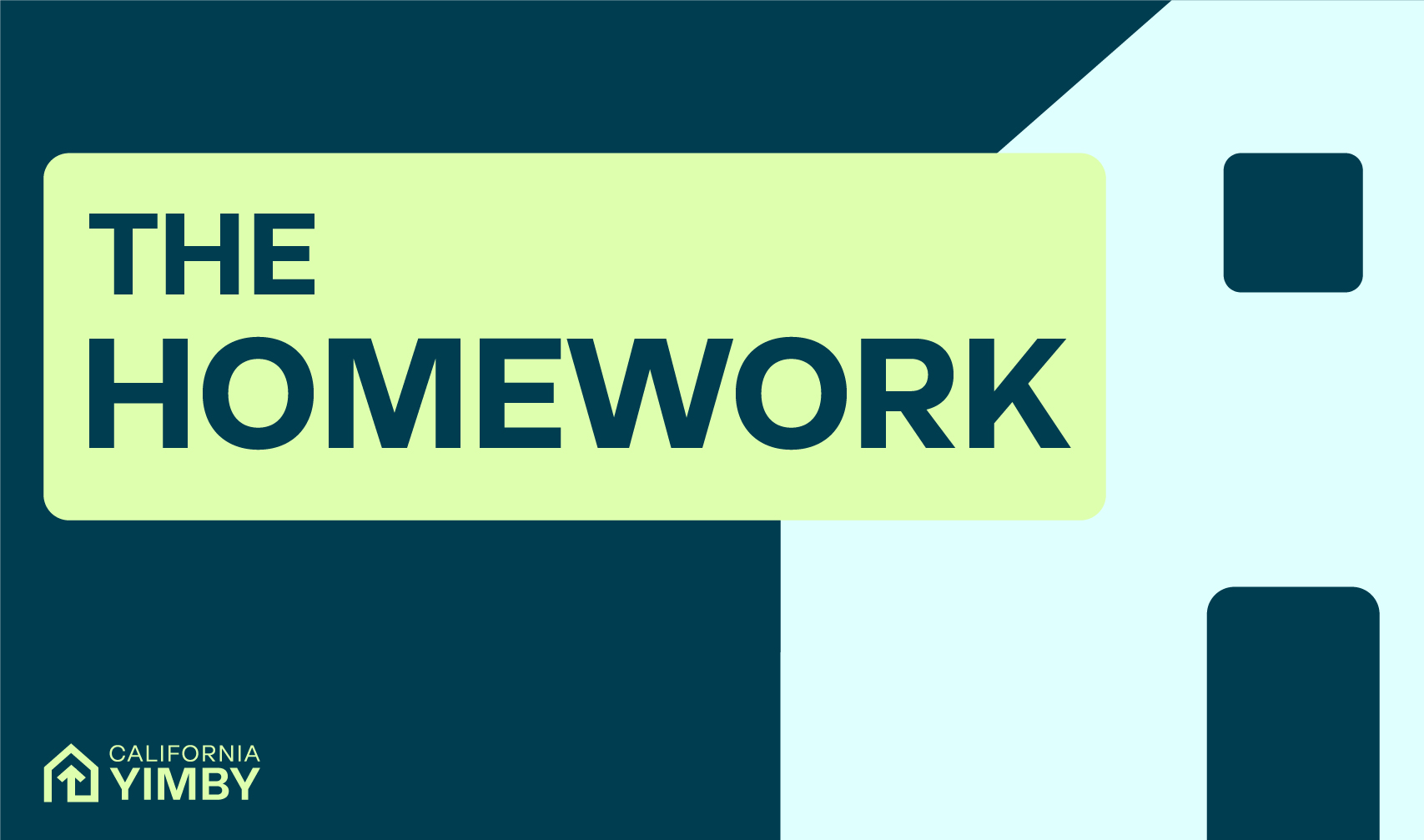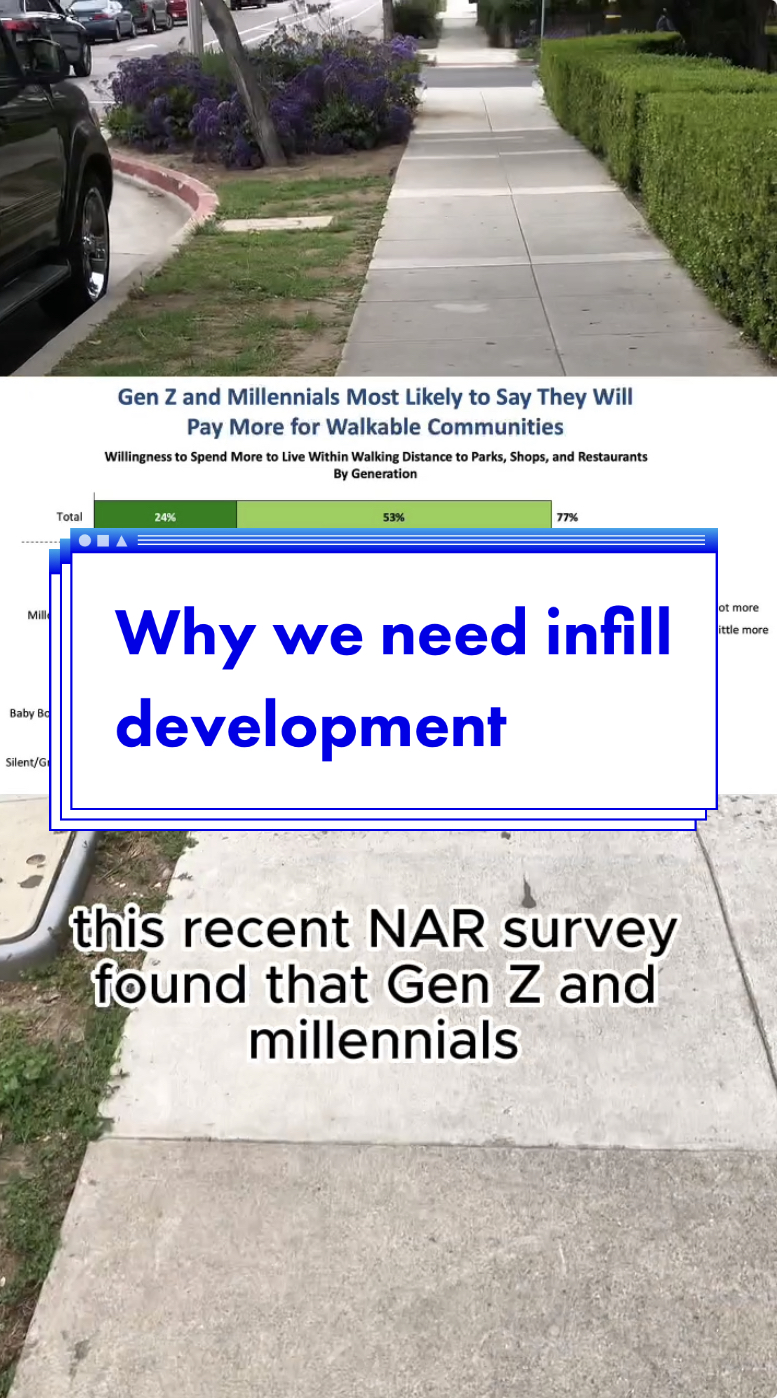The HomeWork: July 26, 2023

Welcome to the July 26, 2023 Main edition of The Homework, the official newsletter of California YIMBY — legislative updates, news clips, housing research and analysis, and the latest writings from the California YIMBY team.
News from Sacramento
We are in the midst of Legislative Recess, where every legislator is back in their district and no legislative action will be taken until they return on August 14th. Once we are back from recess, there will be bills presented on the Senate or Assembly floor if they have no fiscal cost, and the rest of the bills will be referred to the appropriations committee.
The following California YIMBY sponsored and high-priority bills are in the appropriations committee (California YIMBY sponsored bills are starred):
- AB 1633 (Ting)* ends the inappropriate use of the California Environmental Quality Act (CEQA) by jurisdictions that attempt to block new housing developments that have already been found in compliance with local and state land use and environmental regulations.
- SB 684 (Caballero)* creates new pathways to homeownership for middle-income Californians and communities of color by making it faster and easier to build smaller, more naturally-affordable homes near jobs, schools, transit, and other amenities.
- SB 423 (Wiener)* permanently extends the provisions of SB 35, reducing housing costs while ensuring that new affordable and mixed-income homes are built faster in the places they’re most needed.
- SB 450 (Atkins) strengthens SB 9 by clarifying the intent and purpose of the law, and by giving state agencies the authority to enforce its provisions in cities that try to block it.
- SB 4 (Wiener) provides a streamlined process for religious organizations and nonprofit colleges to develop affordable housing on their property.
- AB 835 (Lee) directs the State Fire Marshall to study Point Access Block policies and provide a report to the Legislature and the California Building Standards.
California YIMBY also has one sponsored bill that is going straight to the Senate Floor: AB 976 (Ting), which will permanently extend the ability of property owners to build affordable, rental accessory dwelling units (ADUs) by extending the rental unit provisions of 2020’s AB 881, which expire in 2025.
The suspense hearing for the Assembly and Senate Appropriations Committee is expected to be on August 31st. Suspense hearings determine which bills make it out of appropriations, are amended, or will be held in committee.
To stay current on what housing bills California YIMBY is sponsoring, supporting, and watching, you can now use our Abstract link to track with us.
We will have more housing legislation news in the coming weeks as bills are refined, amended, and scheduled for committee hearings. To stay up to date on committee action, and to receive alerts for bills and other legislative activities, join our Rapid Response team.
Housing Research & Analysis
Clash of the Titans: When Housing and Environment Super-Statutes Collide
A newly published law review article by UC Davis’s Chris Elmendorf and attorney Tim Duncheon investigates the slow-motion collision between two statutes at the center of California’s housing crisis: the California Environmental Quality Act (CEQA) and the state’s Housing Accountability Act (HAA).
Each statute has a bona-fide claim to being a “super-statute,” one which exerts a “broad effect on the law.” Yet the two statutes came of age in different eras—CEQA in the 1970s and the HAA in the 2010s—and they have fundamentally different institutional and normative premises.
Key takeaways:
- CEQA was written in an era when cities were under siege from multiple directions from harmful and/or polluting projects and policies like urban freeways, and industrial facilities.
- But in the intervening years, conditions on the ground have changed, along with other related policies, putting CEQA in the position of impediment to environmentally beneficial projects like infill housing and transit.
- The passage of the Housing Accountability Act has set up a clash with CEQA that must be resolved to achieve desired climate, environmental, and other public policy outcomes.
Do Investors Drive Up Housing Costs? Dutch Researchers say, “Nee.”
In order to promote homeownership and prevent investment companies from purchasing owner-occupied homes, the Netherlands enacted a law in 2022 that allows municipalities to ban investors from purchasing properties under a certain price cap if they had the intention of reselling or renting them out (“buy-to-let” investments).
A new paper from Marc Francke, Lianne Hans, Matthijs Korevaar, and Sjoerd van Bekkum explores the impact of these buy-to-let bans on real estate transactions, housing prices, rents, and neighborhood demographics. The research team looks at impacts of the policy within Rotterdam, and nationwide.
Key takeaways:
- Where bans were enacted, investor purchases of owner-occupied homes decreased by 23 percentage points in Rotterdam and by 10 percentage points nationwide.
- The share of properties sold to first-time homebuyers increased by 13 percentage points in Rotterdam and six percentage points nationally.
- The buy-to-let bans had no discernable impact on house prices, but they raised rents by four percent. This is likely because, as more properties became owner-occupied, there was a decrease in available rental units.
- The findings suggest that the policy helps middle-class households become first-time homebuyers but may also negatively impact lower-income renters by raising rents or limiting entry to the neighborhood.
Houser Headlines
- L.A. hotel workers endure hours-long commutes, car sleeping to afford homes elsewhere
- Farmers Insurance puts cap on new California property policies
- When Climate Change Hits Home – The New York Times
- Opinion: Newsom says California’s anti-housing environmental law is ‘broken.’ So why won’t he fix it?
- S.F. rejected a condo development years ago because of plans for a Starbucks. Now, it’s making a comeback
- Coastal Commission needs to get out of the way of sensible, needed development
- This Bay Area waterfront enclave is an ‘ideal’ spot for new housing. Why can’t anyone build there?
- ‘Low-income’ in the Bay Area with a $100K salary? Yes, it’s possible.
- ’We can’t escape’: climate crisis is driving up cost of living in the US west | California | The Guardian
YIMBY Social – Top Posts

Share the good word
We welcome your ideas and feedback — send story tips and ideas to Homework@cayimby.org.